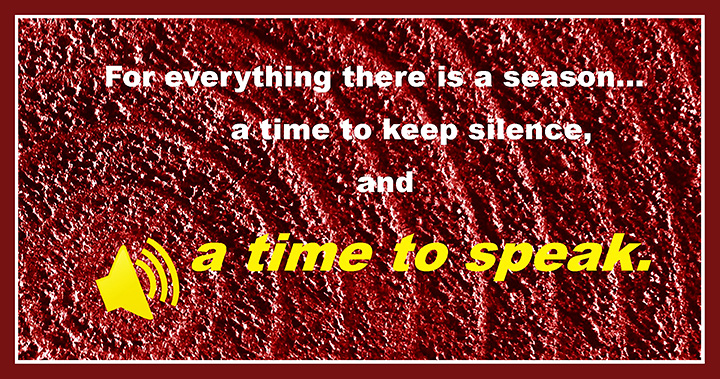
Silence, yes, but not alwaysCOFFEE WITH WARREN, with Warren Harbeck |

|
Wise words from Ecclesiastes 3. There was lots of reader interest in last week’s column on the ancient wisdom of “a time to keep silence.” Ironically, at about the same time that the print edition of the column’s host newspaper, the Cochrane Eagle, was being delivered, history cried out: “Yes, but don’t forget the rest of that quote from Ecclesiastes: ‘For everything there is a season…a time to keep silence, and a time to speak.’” Silence, yes, but not always! Before I interrupt the silence, however, here are three of the many responses I’ve received to that column: From North Vancouver, BC, author Philip Thatcher writes: “Listening lies at the core of any conversation and the silences that breathe between words and thoughts and return to the listening core are truly golden.” From Cochrane, expressive arts educator Dara Dines agrees: “Your experiences with silence in the Stoney Nakoda culture remind me of similar experiences I had while teaching in Japan. Each student would speak with long pauses before the next person would speak and pause. “At first, I would jump in and fill the pauses with words. In the same way that you wrote about, they would wait patiently for me to finish and then pick up where they left off, each taking their turn pausing and then speaking again. After some time I learned to do the same. In fact, in my best classes I hardly talked at all, but rather listened to them and in this way we all learned English together. I felt that this was one of the biggest gifts the Japanese women gave me.” Former Ghost Lake Village mayor Angus McNee, retired now and living in the Okanagan, writes: “While working as a member of the Cochrane Youth Justice Committee, I attended a workshop on open and closed questions. The closed questions were easy, and simply prompted a ‘yes,’ ‘no’ or ‘maybe’ response.” Then there were the open questions, Angus says, probing questions that touch the heart, such as, “How did your mother react when she found out?” Such questions, he says, are “frequently followed by a deep, lingering pause which seems to go on forever. Just silence – a silence that is often broken with a flood of tears and sobbing. A reaction that you know has come straight from the heart. One that brings with it remorse. Powerful stuff.” Yes, silence is powerful stuff. But there’s also a time to speak. By now, we’re all aware of last week’s terrorist assault on two mosques in Christchurch, New Zealand. A hate-mongering, boastful gunman murdered 50 Muslims during their time of prayer and left many others injured. What is to be our response to this all-too-common evil of our day? Shall we just shrug our shoulders and remain silent? The words of German Lutheran pastor Martin Niemöller, an imprisoned critic of Adolf Hitler’s regime, speak prophetically about the consequences of such silence: “First they came for the socialists, and I did not speak out – because I was not a socialist. Then they came for the trade unionists, and I did not speak out – because I was not a trade unionist. Then they came for the Jews, and I did not speak out – because I was not a Jew. Then they came for me – and there was no one left to speak for me.” And then there’s this from Niemöller’s contemporary, German Protestant pastor Dietrich Bonhoeffer, who was hanged for his opposition to Hitler: “Silence in the face of evil is itself evil: God will not hold us guiltless. Not to speak is to speak. Not to act is to act.” Wed. evening, April 10, the Ahmadiyya Muslim community will hold its 11th annual World Religions Conference at the Cochrane RancheHouse. The topic: “Universal Compassion, the Core Human Value.” What a worthy response to last week’s horror! Stay tuned. © 2019 Warren Harbeck |